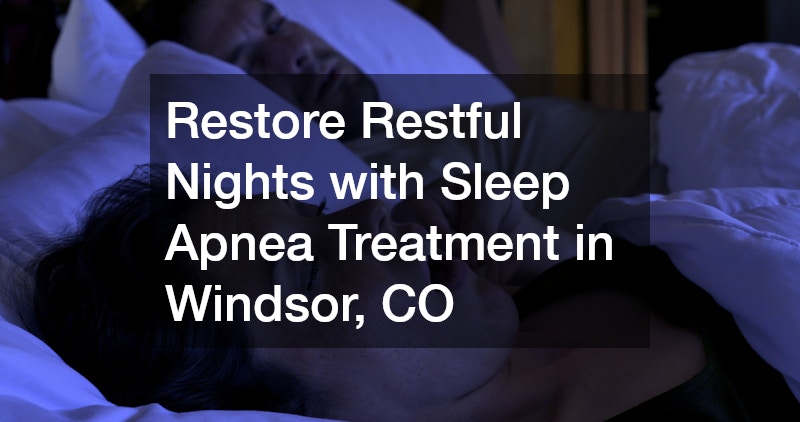Find Relief with Expert Sleep Apnea Treatment in Windsor, CO
Find Relief with Expert Sleep Apnea Treatment in Windsor CO
Sleep apnea is a serious sleep disorder that can affect every aspect of your health and quality of life. Many residents of Windsor CO experience symptoms such as loud snoring, restless nights, or constant daytime fatigue without realizing that these may be signs of sleep apnea. Fortunately, with access to expert sleep apnea treatment in Windsor CO, individuals can take steps toward restoring healthy, restful sleep.
What Are the Common Symptoms of Sleep Apnea?
Recognizing the symptoms of sleep apnea is the first step toward effective care.
Understanding the Signs: Snoring and Breathing Interruptions
One of the most common warning signs of sleep apnea is loud, persistent snoring. Often, a partner or family member may notice that the person briefly stops breathing or gasps for air during the night. These pauses occur when the airway becomes blocked or collapses, interrupting normal breathing. This cycle can repeat dozens of times each hour, disrupting sleep patterns and oxygen flow. Seeking sleep apnea treatment in Windsor CO can help diagnose and address these breathing interruptions before they lead to more serious health issues.
Daytime Effects: Fatigue and Concentration Issues
Because sleep apnea prevents deep, restorative sleep, individuals often wake up feeling tired even after a full night in bed. Daytime sleepiness, irritability, and difficulty concentrating are common. This can lead to reduced productivity at work, mood changes, and even an increased risk of accidents while driving. Local clinics offering sleep apnea treatment in Windsor CO specialize in evaluating these symptoms and providing effective solutions to restore alertness and energy.
Long-Term Health Risks: Cardiovascular and Other Complications
Untreated sleep apnea is more than a nighttime nuisance—it can have serious long-term consequences. Chronic oxygen deprivation puts stress on the cardiovascular system, increasing the risk of high blood pressure, heart disease, stroke, and type 2 diabetes. Over time, it can also contribute to weight gain and worsen existing health conditions. Professional sleep apnea treatment in Windsor CO focuses on both managing the condition and protecting long-term health through comprehensive care.
How Is Sleep Apnea Diagnosed?
Proper diagnosis is essential to ensure that the right treatment plan is chosen for each individual.
The Role of Sleep Studies: Polysomnography and Home Tests
A sleep study, or polysomnography, is the gold standard for diagnosing sleep apnea. Conducted either in a specialized sleep center or at home, these tests monitor breathing patterns, oxygen levels, heart rate, and brain activity while you sleep. This data helps medical professionals determine whether apnea episodes occur and how severe they are. Local providers offering sleep apnea treatment in Windsor CO often work closely with accredited sleep labs to provide both in-lab and home-based testing options for convenience.
The Importance of Medical History and Physical Exams
Before recommending a sleep study, a healthcare provider will review your medical history and perform a physical examination. Factors such as neck circumference, nasal passage structure, and family history can play a role in sleep apnea risk. Discussing lifestyle habits, medications, and any underlying conditions helps doctors create a personalized diagnostic approach. With experienced clinicians offering sleep apnea treatment in Windsor CO, patients receive thorough evaluations designed to identify both root causes and contributing factors.
Evaluating Results and Determining Severity
After testing, specialists analyze the data to classify sleep apnea as mild, moderate, or severe. This classification determines the best course of treatment. For mild cases, lifestyle changes such as weight management, smoking cessation, or positional therapy may be effective. For more severe cases, medical devices or surgical options might be necessary. Providers specializing in sleep apnea treatment in Windsor CO guide patients through these options, explaining the benefits and potential outcomes of each.
Get Treatment Today
Tackling sleep apnea begins with taking the condition seriously and seeking professional guidance. Effective treatment options vary depending on the cause and severity of the disorder, but the goal is always the same—restoring normal breathing patterns and ensuring quality sleep.
Common treatments include Continuous Positive Airway Pressure (CPAP) therapy, oral appliance therapy, and sometimes minimally invasive procedures to open airways. CPAP machines deliver steady air pressure to keep the throat open, while oral appliances gently reposition the jaw and tongue. Many Windsor residents benefit from these devices after working with local specialists who tailor sleep apnea treatment in Windsor CO to their specific needs.
Lifestyle adjustments can also enhance treatment results. Losing weight, reducing alcohol intake, and avoiding sedatives before bed can all make a difference. Additionally, positional therapy—training the body to sleep on one’s side rather than the back—can prevent airway collapse during sleep.
Whether you’ve just begun noticing symptoms or have struggled with sleep issues for years, now is the time to act. Untreated sleep apnea can have lasting effects on your physical and mental health, but effective care is within reach. Local experts provide comprehensive evaluations, personalized treatment plans, and follow-up support to ensure lasting relief.
Take Control of Your Sleep Health
You don’t have to live with restless nights or daytime exhaustion. Professional sleep apnea treatment in Windsor CO offers hope for a healthier, more energized future. With expert guidance, advanced diagnostic tools, and proven therapies, you can breathe easier and sleep better every night.
If you’re ready to improve your sleep quality and overall well-being, contact a local provider today to schedule a consultation for sleep apnea treatment in Windsor CO. By taking this step, you’re not just addressing a sleep disorder—you’re investing in better health, longer life, and renewed vitality.



